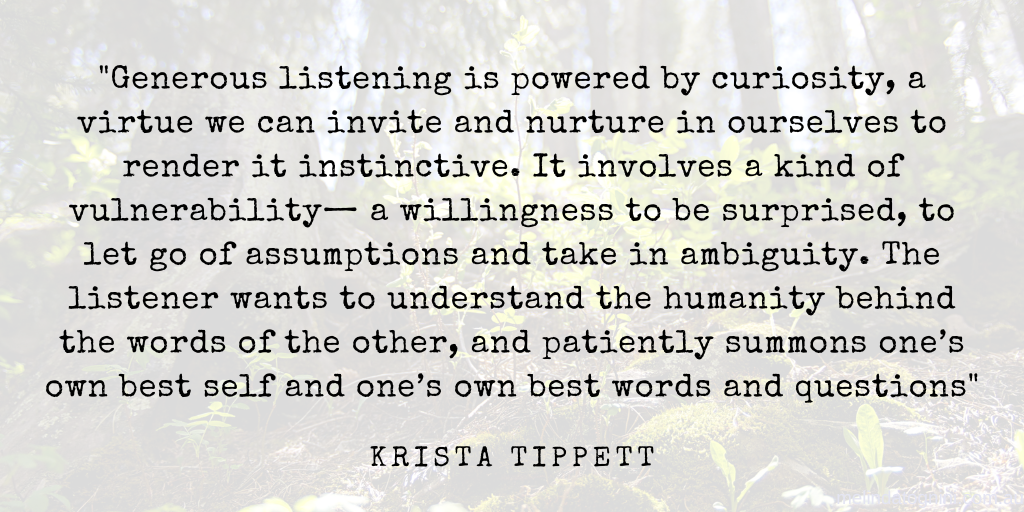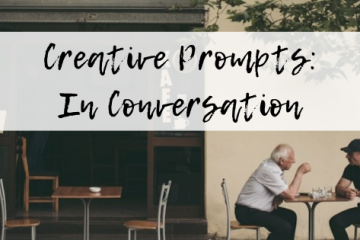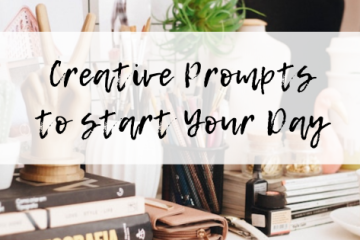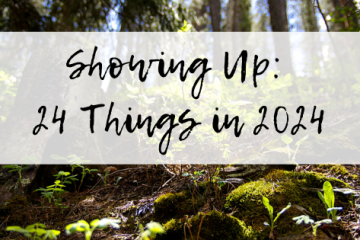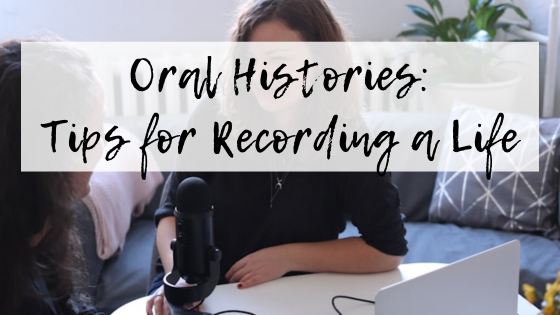

I recently listened to a conversation between Krista Tippett and Rachel Naomi Remen (and which Tippett expands on in her book Becoming Wise: An Inquiry into the Mystery and Art of Loiving) in which they discuss the idea of ‘generous listening’, which is ‘powered by curiosity’ and ‘involves a kind of vulnerability’.
I think this is such a lovely way to frame the heart behind recording an interview, whether that be an oral history, an interview with an author or some other conversation. At least, this is how I want to approach it; I’m not interested in the kind of interview that sets out to catch someone out or become fodder for an expose. Instead I want to embark on a conversation that, as Rachel Naomi Remen suggests, asks, ‘what’s true for this person?’
There are a number of components to conducting an interview in this spirit, and while there’s not the space to provide a comprehensive resource in a single blog post, I would like to touch on just a few aspects here:
- background research and other preparation
- the interview itself
- ethical considerations
Background Research and Preparation
Brainstorm what information you already know about your interviewee. This might be through your existing relationship with them, by talking to friends and family, or even a search online. Spending time researching and finding out what is already available will help you conduct an interview that offers fresh insights rather than simply rehashing what can be uncovered by a quick google search or Wikipedia entry. Of course, as Ann Curthoys and Ann McGrath write in their book How to Write History that People want to Read, “ Many stories can only be learnt via oral histories” (p. 92).
It can be helpful to meet up with your interviewee prior to your official interview, partly to put you both at ease and deal with any paperwork (such as participation information and consent forms that are used in more formal oral history projects). It can also help begin the conversation about the person’s life and offer hints about the sort of questions worth asking.
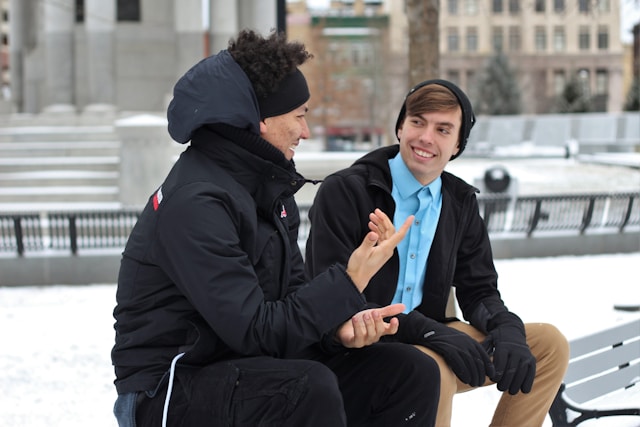
The SOUL of Interview Questions
Simple – the best questions have one part to them without too much preamble. When you ask a question with multiple parts, it can make it difficult for the interviewee to remember all they are being asked or know what aspect of the question to focus on. If a question has two or more parts, divide it into several questions.
Open – avoid questions that invite a yes or no answer (known as a closed question), or “lead” the interviewee to answer in a particular way. Instead frame the question so that it is “open” and invite the person to answer freely in any direction they want to. Questions beginning with what, when, where, why and how questions are often open-ended.
Unknown – Ask genuine questions, what you don’t already know the answer to. Rather than ask a question where the answer can be found via google or is common knowledge within your family, make a reference to what you already know (e.g. I believe that you served in the navy during the Second World War …) and then ask a question that invites a story or new information that is not already known widely.
Listen. Listen. Listen. It’s easy to get so caught up in getting through the questions we have prepared that we charge on to the next question without actively listening to the response to the previous one. Know the questions you would like to ask, but be prepared to cut, rearrange or ad-lib as you listen deeply and engage in what your interviewee is actually saying.
Ethical Considerations
At one point oral history interviews prioritised the needs of the historian, but in more recent years, the pendulum has swung to protect the person being interviewed. I think this is only fair. It is, after all, their life that is being recorded, an act that requires a certain amount of vulnerability, and they deserve to have some agency about what they say and how that information is subsequently used. I would certainly want to know I could trust the other person with my story, and that it wasn’t going to be manipulated, misrepresented or misused.
Oral History Australia has some “Guidelines for ethical practice in oral history” that can be found on their website and outline the responsibilities of the interviewer. The Oral History Association in the US also has detailed guidelines on their website.
In my own practice, I consider interviews as a collaboration. When I was researching the stories of war widows for my book Many Hearts, One Voice, for example, I gave them a participation information sheet that outlined the project and how the interview would be used. Once the interview was over, I then transcribed each interview before providing a copy of the interview and its transcription for them to go over and approve. I later also let them read any sections of the book that included information about them, or quoted from them. Only once did someone request I omit something I had included. More often, I found that this collaboration would trigger another detail or spark an additional memory.
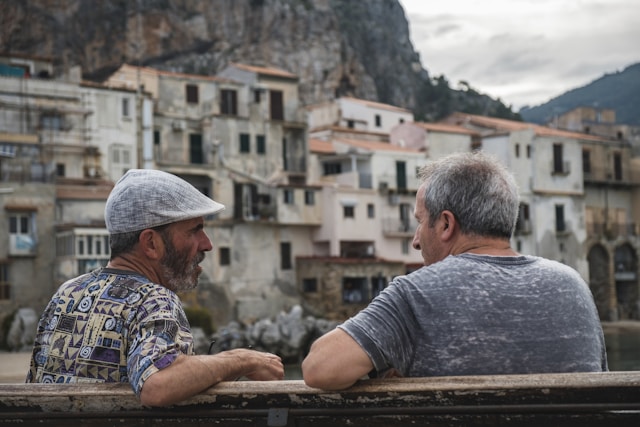
Recording the Interview
I’m not an expert on recording equipment, so I’m not going to offer advice about that. However, I will say the recording equipment you have with you (e.g. your phone with a decent app) is better than the equipment you have left at home or don’t know how to use. A phone also has the advantage of being ordinary and therefore relatively unobtrusive, so your interviewee may feel more at ease, even though a higher quality device may have a better sound. So it really depends on your purpose – are you just wanting to capture a relative’s story before it’s too late, or are you hoping to produce a podcast or other archival quality recording?
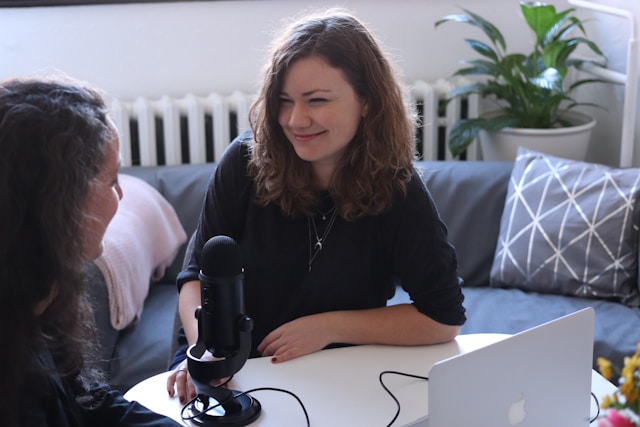
Related Blog posts
Oral Histories: Connecting the Past, Present and Future
How I Met Your Grandmother and Other Stories
Additional Resources
Oral History Association resources, including best practices and ethical guidelines
Oral History Australia‘s resources, especially its guide to ethical practices
Australian War Memorial’s information on “researching a person” has a “Guide to Recording Oral Histories“, which comes as a downloadable PDF (scroll to the bottom of the webpage to find it)
The Oral History Handbook, published by Oral History Australia SA/NT, published 2013 (with a new edition in the works)
